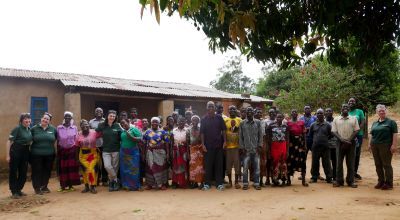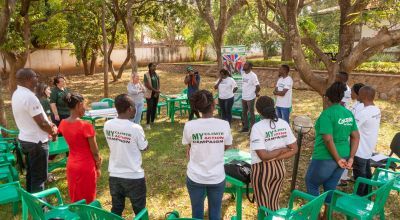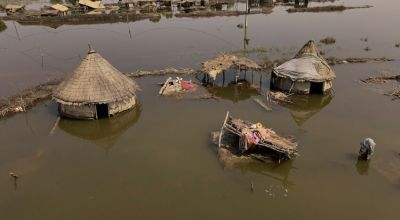
Read our 2024 annual report

Knowledge Hub
As Concern’s team approaches Mkulira village, Malawi, we are greeted by dancers, singers and drummers, warmly welcoming us to their home.
Mkulira is a remote village in Mwanza, a district in Malawi on the border of Mozambique, where — much like the rest of Malawi — agriculture is king. Over 80% of the country is employed by agriculture, meaning that over 80% of the population depend on farming for their income, and often food for their own families.
Unfortunately, this also means that Malawi is disproportionately more vulnerable to climate shocks, despite being one of the countries least responsible for global emissions. In the last four years, Malawi has been devastated by cyclones, with Cyclone Ana causing widespread flooding in early 2022, and 2019’s Cyclone Idai, of which Malawi was at the epicentre, being called “one of the worst weather-related catastrophes in the history of Africa” by the United Nations Secretary General António Guterres.
On the other side of the coin, unpredictable rainfalls and drought can wreak havoc on agriculture. While Malawi’s rainy season usually spans from October to April, the 2022 rainy season had a poor start, with rains not beginning until January and even then being below-average for many parts of the country. This led to delayed, reduced or even destroyed harvests for farmers. Poor rainfall also vastly increases the workload for farmers, who struggle to irrigate their land by hand.
This was a big problem for the farmers of Mkulira village. Joseph Marley, the Chief of the village, explained how tough the past few years have been for the area due to poor rains, forcing farmers to use watering cans and buckets to irrigate their fields. This was not only extremely time intensive, but labour intensive too. “In the past, it was very difficult, as you can see how large the place is,” he said. “To water using watering cans, it was tough work. For us last year, the climate was not good in terms of rainfall, so harvests were very low.”
However, Mkulira is home to the Titukuke Scheme, a group of farmers hoping to innovate when it comes to irrigation and farming. The Titukuke Scheme pitched their scheme to Concern Malawi’s team, and applied for a solar-powered water pump.
Solar power
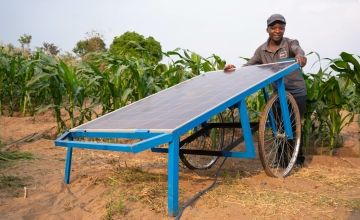
Solar-powered water pumps can lift water from a pond, lake, river or borehole, and pump the water at high pressure without needing access to electricity. The power comes from daylight, and allows users to operate the pump in remote locations during dry seasons. Once connected to the chosen method of irrigation, solar pumps massively reduce the time and manual labour of irrigation, allowing farmers to use their time and energy on other activities. While the up-front costs can be expensive, solar pumps are much cheaper than fossil fuel alternatives in the long-run, as well as being much better for the environment.
Concern provided the scheme with the solar pump, which can be used for around three hours at a time before recharging for a half hour. Mcfreson Aaron, 33, is a lead farmer and treasurer of the Titukuke Scheme. When we met him in Mwanza, on a trip as part of the EU and Irish Aid-funded campaign 1Planet4All, he explained that even though it is early days, he can see how the pump is already changing how they farm.
“Concern has helped us with the solar pump, which has relieved us with the work we used to do with water buckets for irrigation,” he said. “That big work has been simplified, so we are very happy because some of the work has become lighter for us. We were cultivating a small place [due to our] work capacity. But since the solar pump came, it has helped us to cultivate a large area in order to harvest more yields.”
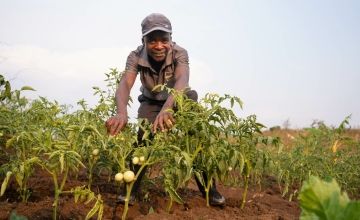
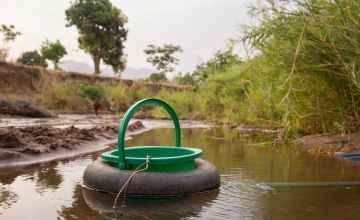
Mcfreson said that the farmers use the pump until they are too tired to work anymore, and retire for the day. And due to the area it can cover, the work is less intensive.
“With buckets, you water for two days and you find that the moisture is gone. The solar pump gives us time to rest. We water this Friday, thereafter we are going to water on the following Friday. So we have time to go to work in our gardens.”
Innovating through agriculture
The farmers in the scheme are already seeing the returns in their harvests, as they are now able to irrigate much larger plots of land. However, the improvement in their harvests is not only down to the solar pump. Concern also provided the Titukuke Scheme with training in climate smart agriculture, encouraging the farmers to diversify their crops — for example, growing tomatoes as well as maize — and use new farming techniques.
Joseph, 48, explained: “Nowadays, because of climate change, we are growing different crops, especially hybrid seeds. Our friends from Concern are the ones who have helped us with different seeds for the crops which exist where we are standing.
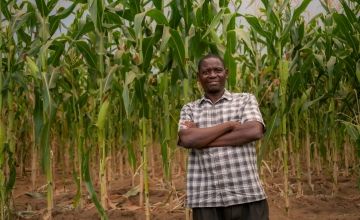
“In the past, we farmed without good techniques. For example, our ridges were very long. [Concern] taught us that the space between our ridges should be 25cm. Because of this, in a small area, we are harvesting more crops. Now we are benefiting a lot because of the techniques our field officers have taught us.”
The training also showed farmers how to make a fertiliser called Mbeya, which is made from animal dung, maize bran and water that improves and protects the soil and its fertility. This mix is added to a small amount of existing fertiliser. As fertiliser can be expensive to buy, this stretches out what farmers have cheaply, from resources they have access to.
Hopes for the future
Mcfreson, who has two children aged 10 and seven, is applying his new knowledge of climate smart agriculture and land preservation to his daily work, and hopes that one day, he will have his own solar pump to use in his own garden. In the meantime, he believes the farmers of Mkulira will see an improvement in their lives due to the income generated from their crops.
“Everyone has ambitions which they want to accomplish. But because of poverty, they underrate themselves, and they don’t accomplish their ambitions,” Mcfreson said. “However, because we have received training on modern farming, some of the things we considered to be impossible, we now take them to be possible. I see that things will be different in our everyday life.
From what I have learnt and the solar pump that we have received, there is a future
“We are hoping that our families will move forward, maybe children’s school fees will be available with time. Our households will be improved. If we weren’t sleeping in a good place, we will find a good sleeping place. If we don’t have an iron sheet roofed house, it will help us to have a house roofed with iron sheets. If we don’t have livestock, once we sell crops we can buy livestock. The animals will help us with dung for making fertiliser. Then we are going to develop in our households.
“From what I have learnt and the solar pump that we have received, there is a future.”
As Chief of the village, Joseph says he is “double benefiting” from the impact of the solar pump. He said: “Some of us didn’t have livestock, the population of livestock in the village was low. Now through this scheme, farmers will buy other livestock, so the population of livestock will increase. The livestock that will be bought will help us with manure, which will be applied here at the scheme.”
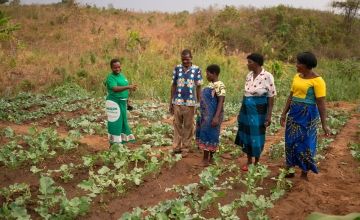
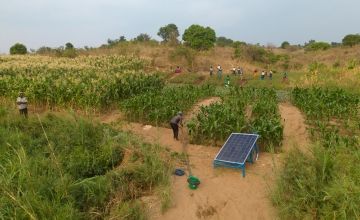
He also noted that the teachings they have learned are not stopping with the scheme, as the farmers are sharing their knowledge — and even the solar pump — with their neighbours in Mkulira. “This has been the main school where all the people from the village came to learn.”
While Joseph hopes to work further with Concern Worldwide in Mwanza, he is grateful for the support already given to the village, and sees a bright future for the families in Mkulira.
He said: “In our vision, we think that in three years to come, everyone should be self-reliant on food. We want to reach a point where we have defeated hunger. We are done with it.”
Organisations who fund us



